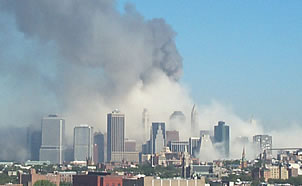
What I Saw: Brooklyn
8:35 a.m.: The phone rings. It's Lena, my best friend. She never calls this early. "You up?" she asks, her voice getting that shrill tone I recognize whenever she's nervous or excited. I'm wide awake but still lazing around in bed. "No," I answer. "But it's okay. What's up?"
"A plane just crashed into the World Trade Center," she says rapidly. Lena is calling from her home office in Harlem, tuned into ABC's morning news show.

The Manhattan skyline seen from Brooklyn during the collapse of the World Trade Center towers.
"Whaaat?!" I gasp, grabbing the remote. I click on ABC, but the picture on the screen—showing a building gushing flames and smoke—is frozen. A squiggly pattern line is running across the screen. "Lena! The picture on Channel 7 isn't moving. Are you getting reception?" She's 14 miles north of the fire and smoke raging in Lower Manhattan. "Yeah, everything here is okay," she says.
8:57 a.m.: I hit all the commercial channels quickly, repeatedly. Nothing but frozen images. Then I click to the cable channels. They're fine. I know the tower on top of one of the World Trade Center buildings sends television signals to my part of Brooklyn. Suddenly, the picture on the screen starts to move. Reception is back.
9:18 a.m.: Out of nowhere comes another plane. "Oh, my God! There's a second plane!" Lena shrieks. It heads straight for the second World Trade Center tower, crashes through and rips a gaping path that spews forth ravenous, consuming fire.
"Oh, my God."
9:32 a.m.: Lena is braying at full throttle: "The Pentagon has been hit!"
"We're at war," I say calmly, as if the simple declaration of a fact gives order to madness. "Don't say that!" Lena yells. "You can't have a war without knowing who you're fighting. We don't know who did this."
"Yeah, well that's like saying a murder victim ain't dead if you don't know who the killer is," I crack back. "We're at war." Lena and I then get quiet, on edge. A startlingly beautiful workday had gone cold and dark. By the time we hang up, two hours have passed—and so has life as we knew it before her call.
11:23 a.m.: The journalist in me kicks in. From the roof of my Brooklyn apartment building you can see Manhattan's awesome skyline, with the World Trade Center's twin towers in perfect view. The first tower has crumbled. I quickly dress and run up to the roof, just in time to see the second tower go down. Eerily, a towering inferno sinking to the ground in a billowing cloud of black smoke. There are others on the roof, as well: freelancers and the self-employed like me who work from home; housewives; the building superintendent; the Palestinian owner of the grocery store on the corner; two construction workers. We all stand mute, transfixed, traumatized.
Our little band of neighbors, merchants and workers reflect the great ethnic mix that has always given New York its dynamism and its grit. But as we watch—African-American, Hispanic-American, Arab-American, Euro-American—the hyphenated adjectives that mark our differences suddenly fall away like the towers themselves. Left standing is the American in all of us. We look at each other sadly, but also hopefully. Because we all know in that terrible instant the second tower collapsed that we are all in this together.
Postscript: African-Americans occasionally joke that we don't want to be caught in the belly of the beast when it goes down. The "beast," of course, refers to America with its own sins against humanity that demand a reckoning. But we also know that for all of its flaws and contradictions, the real greatness of America is that it inevitably tries to live up to its promise of freedom for everyone.
So yes, we are all in this together. The thousands of people lost in the World Trade Center attacks reflected the same ethnic mix as of those of us gathered on the roof. Our very diversity will prove to be our strength. Whether it's the "homeboys" on my block who now fly the colors of the American flag with the same defiance they once flew gang colors, or the Irish-American firefighters in the station house two blocks away who lost six men (they were among the first on the scene when the World Trade Center went down), it will take all of America's varied races, cultures and sensibilities, uniting as one, to prevail in the months ahead. Let us hope that, like New York City's sometimes-flawed mayor, we will find in our darkest hour, our finest moment, and emerge stronger for having been tested.—Audrey Edwards, '69, is a contributing editor to More Magazine and former executive editor of Essence Magazine.
- Return to Seeing the Unimaginable
- Return to ER on the Streets of New York
- Continue to The Cal Ripken of His Field
- Continue to What I Saw: Ground Zero
- Continue to Lifesaving Flight Is Grounded by F-16s
- Continue to The Minds of Killers—and Terrorists
- Continue to What I Saw: Red Square
- Continue to December 7 and September 11
- Return to 9/11 Contents
- Return to December 2001 Table of Contents